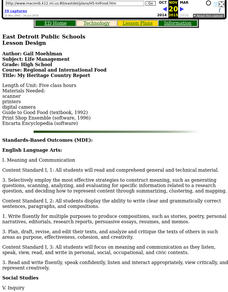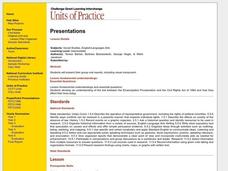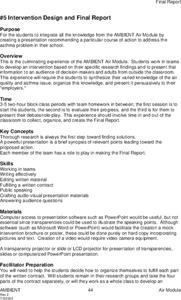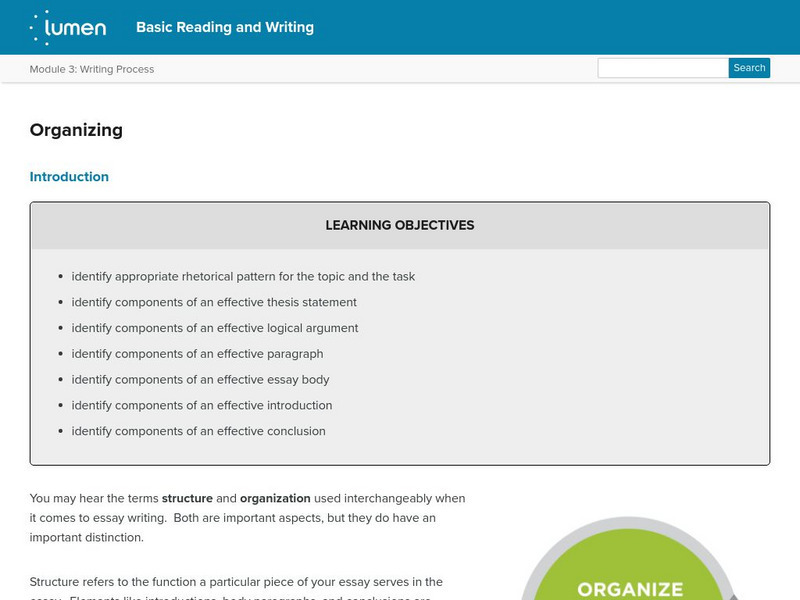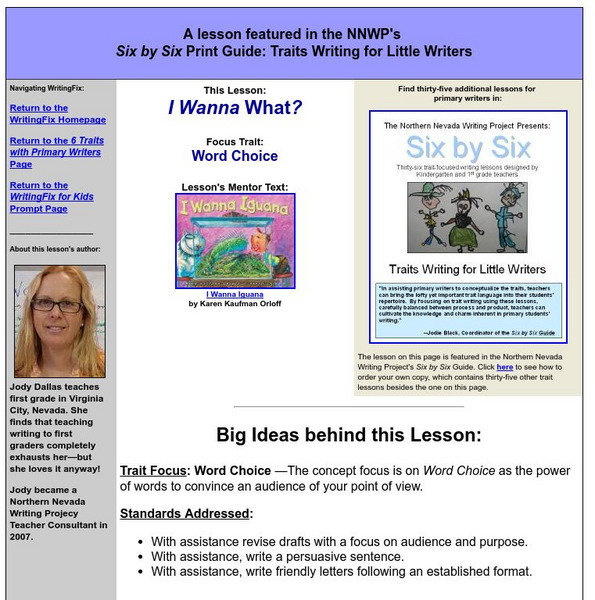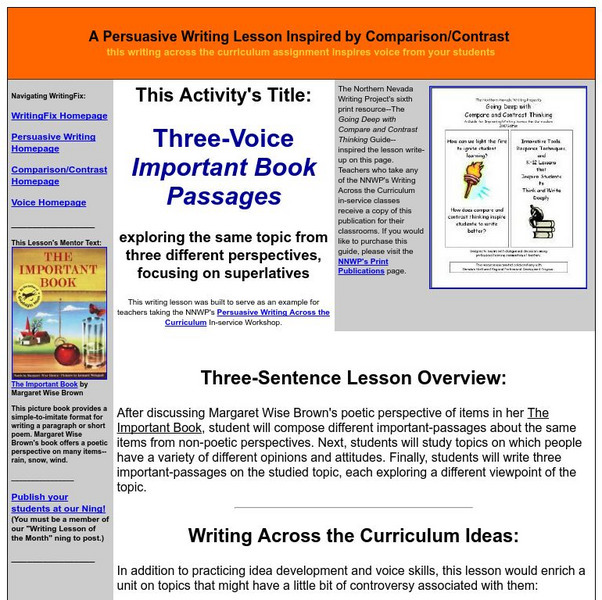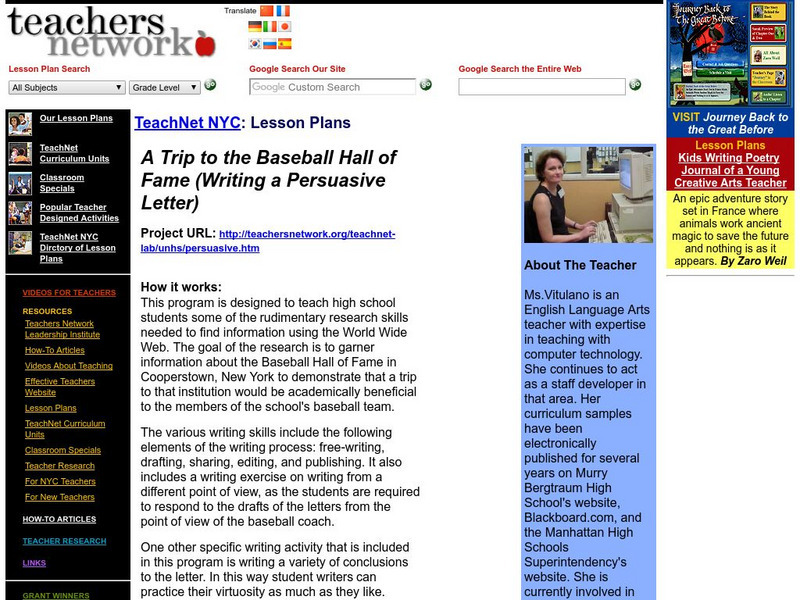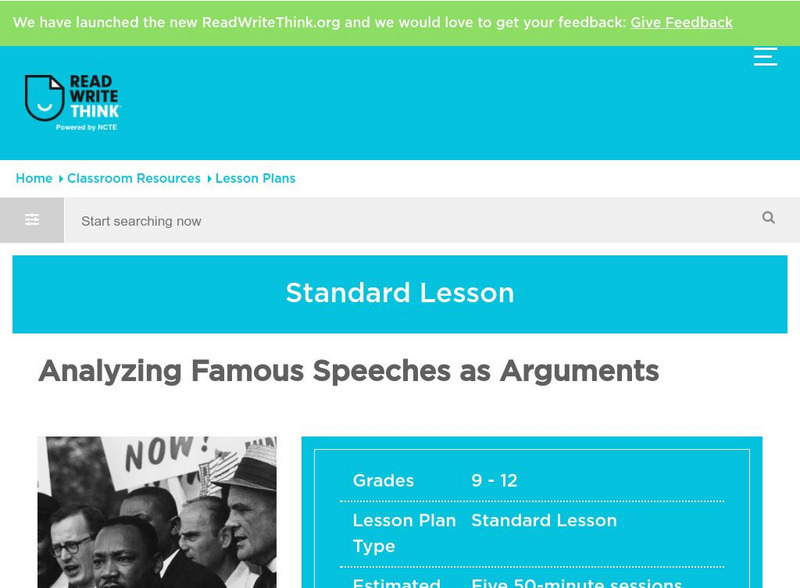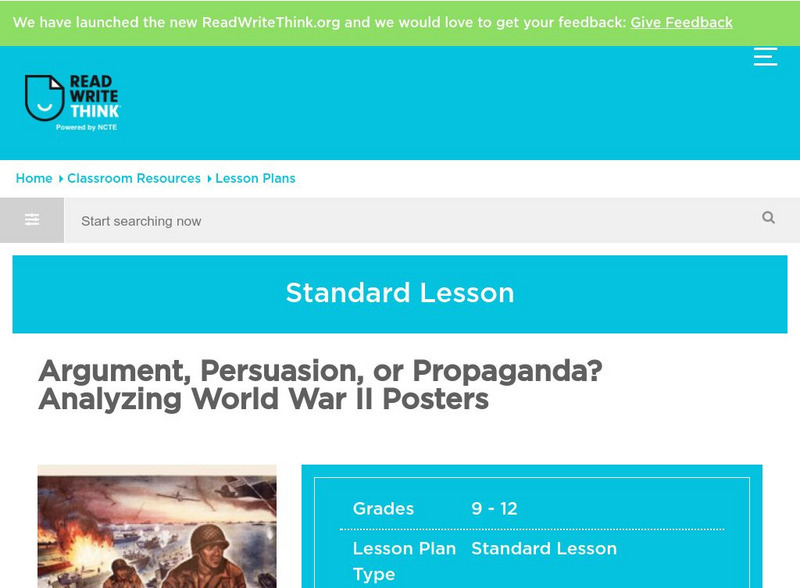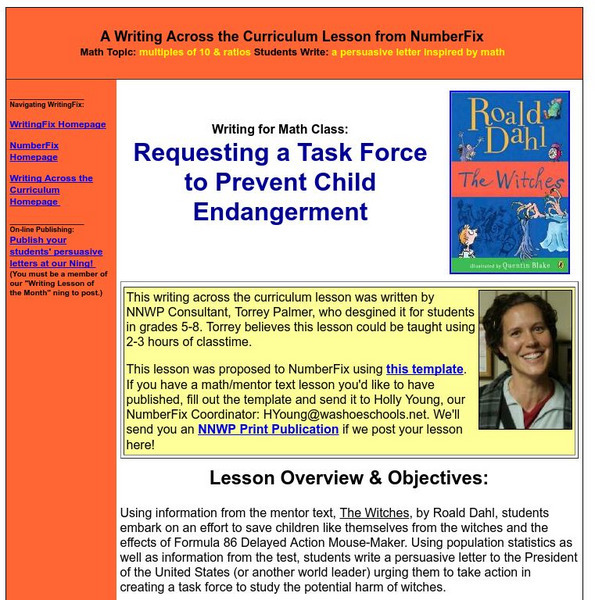Curated OER
My Heritage Country Report
Students list five food dishes that are part of their family's heritage. Each student then does research of a country and a recipe (possibly a family recipe). With the help of members of his/her kitchen group, the student prepares the dish.
Curated OER
Magazine Sales Talks
Students role-play to determine the best types of magazines that should be purchased for their media center. They create a sales presentation for a particular magazine in small groups. As they listen to each presentation they evaluate...
Curated OER
Voting and the U.S. Constitution (Past, Present, and Future), Part 2
Students analyze and discuss the 19th Amendment, and read the document, Why Women Want to Vote. Students illustrate statements from the handbill, then conduct a play about women's suffrage.
Curated OER
Exploring the Celestial Neighborhood
Ninth graders study the origin and organization of the solar system. They investigate the Earth's place in the system and how planetary motions explain natural phenomena observable from Earth.
Curated OER
Intervention Design and Final Report
High schoolers engage in series of studies having to do with the Ambient Air Module. They create a presentation to recommend a solution for the asthma problem experienced by students at school. The rubric is found at the end of the...
Better Lesson
Better Lesson: W.3.1a: Introduce the Topic or Text They Are Writing About
Links to 12 lessons and activities that build student skills in standard W.3.1a: Introduce the topic or text they are writing about, state an opinion, and create an organizational structure that lists reasons.
ReadWriteThink
Read Write Think: Zines for Kids Multigenre Texts About Media Icons
Contains plans for nine lessons that ask students to create multigenre zines for popular culture figures that include letter, persuasive, narrative, acrostic poetry, comic, and biography/autobiography writing. To accomplish this,...
Lumen Learning
Lumen: Writing Process: Organizing
This activity focuses on the organization of your paper including how to write a thesis statement, the elements of an effective paragraph, patterns of organization, transitions, and conclusions. It also provides a video of the Toulmin...
Writing Fix
Writing Fix: I Wanna What?
This lesson is centered on word choice and vocabulary and the book, I Wanna Iguana, by Karen Kaufman Orloff. Young learners learn to grasp the difference between begging and persuading and apply this knowledge to their own persuasive texts.
Writing Fix
Writing Fix: Three Voice Important Book Passages
A lesson plan made for young scholars to write from various perspectives regarding the same topic. The mentor text entitled The Important Book is used, as students become more familiar with voice, point of view, persuasive techniques and...
Other
Teachers Network: A Trip to Baseball Hall of Fame (Writing a Persuasive Letter)
This lesson plan focuses on improving students' persuasive writing skills. Students reseach baseball and then write a persuasive essay to convince the baseball coach that a trip the Baseball Hall in Fame would be beneficial to the...
ReadWriteThink
Read Write Think: Analyzing Famous Speeches as Arguments
This multi-session activity features the opportunity to analyze a variety of famous speeches. Learners will look carefully at tone, rhetoric, propaganda techniques, and historical context as they write an analysis paper....
ReadWriteThink
Read Write Think: Argument, Persuasion, or Propaganda? World War Ii Posters
In this lesson, students will analyze World War II posters. Students will first look at the posters as a whole group and will work independently. Students will to determing how the following terms differ: argument, persuasion and...
Writing Fix
Writing Fix: The Wacky Smear Campaign
Inspired by Barry Lane's book 51 Wacky We-Search Reports, in this cross-curricular lesson students learn how to summarize properly.
Writing Fix
Writing Fix: Requesting a Task Force to Prevent Child Endangerment
In this lesson, Roald Dahl's book The Witches is used as a mentor text. Students will attempt to save themselves and the other children. Students will analyze real population statistics from world-wide and details from the story to...
ReadWriteThink
Read Write Think: Reader Response in Hypertext: Making Personal Connections
Young scholars write a narrative of place, a character sketch, an extended metaphor poem and a persuasive essay then link all four texts to quotations they have selected from a novel.
Writing Fix
Writing Fix: Voice Building Poetry Lesson: Comparison & Contrast Poems
In this lesson, students examine multiple mentor texts to help drive them toward the final persuasive writing assignment: comparison and contrast poems written from a parent and a child's perspective. A short story, two poems, and a song...
Better Lesson
Better Lesson: W.3.1: Write Opinion Pieces on Familiar Topics or Texts
Links to 37 lessons that focus on skills within third grade reading standard W.3.1.
Better Lesson
Better Lesson: Cause & Effect With "Why Mosquitoes Buzz in People's Ears" Day 4
We are finishing up the story today. Today we are finishing analyzing the story by thinking about how the events and characters developed by the end of the text.


